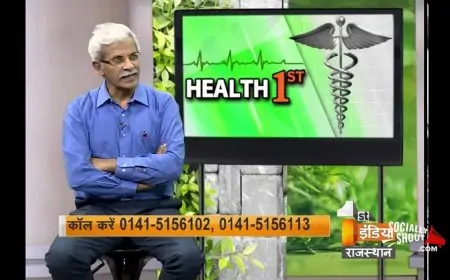Going through a heart attack can be really tough. After leaving the hospital, you might feel a mix of emotions and your body might not feel great either. A heart attack can also affect your mental well-being, making you feel scared or anxious.
Certainly, a heart attack can change your life, but the road to recovery begins with taking care of yourself. If you take good care of yourself, you can improve your chances of recovering faster and having a healthier future.
Let's see what you can do to take care of yourself during this time.
A] The Road To Healing After Suffering From A Heart Attack
After having a heart attack, the first thing you would need to do is to stop feeling overwhelmed.
Thankfully, you’ve survived this almost fatal disease. The fact that you can do things to feel healthier is an even better thing.
All you need to do is take note of these below-mentioned self-care tips.
Tip #1: Manage Your Medication
After a heart attack, you'll need to take a lot of medications prescribed by your doctor. Your doctor will evaluate your health before allowing you to go home and will give you a list of medicines you must take.
Typically, these medications include blood thinners, drugs to lower cholesterol, and medicines for controlling blood pressure. Taking these medicines as directed by your doctor is crucial to prevent future complications.
Some of these medications might have side effects like dizziness, nausea, and fatigue, which are normal. However, if you experience more serious side effects, it's important to contact your doctor. They may recommend a different medication if the current one doesn't suit you.
Tip #2: Make Better Dietary Choices
Most people develop heart disease because of unhealthy food choices. Eating a lot of junk food, foods that are high in cholesterol and bad fats, etc., is what got you into this position in the first place. So, change your diet for a healthier life.
Here are a few tips you can use to build a healthy-heart diet during your recovery:
- Eat a lot of fruits and vegetables to provide strength to your body. Fruits and vegetables contain a lot of fibre, minerals and antioxidants which reduce inflammation.
- Cut down your salt intake because if you consume too much salt, you’ll experience issues with your blood pressure. A diet that’s high in sodium leads to high blood pressure.
- Eat more lean proteins, whole grains, and unsaturated fats.
Once you recover, don’t let go of these good dietary habits. Having a healthy diet even after you recover will reduce the chances of any further heart or health issues.
Tip #3: Regular Exercise And Physical Activity
You should exercise regularly after you suffer a heart attack. But it’s also important that you know that all exercises are not created equal. Since you managed to survive this adverse condition, your body is very weak.
You can begin with light exercises such as walks. Walk around at a slow pace for small durations. It will improve your cardiovascular function and there will be no strain on your heart.
Once you feel comfortable walking, you can gradually progress to other exercises that your healthcare expert has suggested.
Benefits Of Exercising After A Heart Attack
There are many reasons why doctors recommend very light exercises after a cardiac arrest:
- Exercising regularly will strengthen your heart muscles.
- The more you engage in physical activity, your heart will work more efficiently.
- Regular exercise will promote better blood circulation.
- You’ll be able to manage your weight and also lower your blood pressure.
Tips To Follow While Exercising
While exercising, you mustn’t be too negligent. Remember that you have to be gentle with yourself. Here are a few things you must keep in mind while exercising so that your heart rate does not fluctuate a lot.
- Monitor Your Heart Rate
Keep a check on your heart rate now and then while exercising. Your doctor will tell you about the recommended heart rate. You should ensure that you stay within the recommended target rate zone as it will keep you safe.
- Stay Hydrated
Consuming the right quantity of water will allow you to maintain your blood volume. Staying hydrated will also regulate your body temperature. So, you must make sure that you consume enough water before and after your workouts.
- Listen To Your Body
Getting some physical activity does not mean that you need to stress out your body. Your body will give you signals about when it’s time to stop. If your heart starts pounding heavily during workouts, take breaks. Your body might also react differently to exercising. For example, you might feel chest pain, dizziness, or shortness of breath. If so, it’s best to stop and not put your body through strain.
Tip #4: Work On Stress Management
Stress can affect your body. A heart attack can make you feel even more stressed. Stress can cause high BP and other complications that can lead to a heart attack.
But there’s a way to feel better. It’s all about managing your stress. You can try to meditate. Choose a place where you can have a quiet time. Meditating will allow you to stay calm and feel better inside.
Practising mindfulness is another way to relieve stress. Pay attention to the moment you’re in. If you focus on the present moment, it allows you to balance your emotions.
How To Manage The Stress Levels?
Working the stress levels is something that every heart attack survivor should do. Let us tell you some strategies you can use to manage your stress.
- Engage in some deep breathing exercises. Deep breathing allows you to stay grounded and live in the present moment.
- You can also try exercising regularly because you will feel a sense of accomplishment at the end of every session. It will make you feel less stressed and confident about your health.
- Join a local support group that has people who have survived heart attacks. Conversing with these people will give you the strength to deal with your situation.
Stress won’t do you any good. So, it’s best that you engage in some stress management practices to make your mind and body feel refreshed.
Tip #5: Give Up Alcohol And Smoking
Continuing to smoke and consume alcohol is one of the worst things you can do after suffering from a heart attack. Quitting these bad habits will prevent you from having another episode of cardiac arrest.
Once you quit these deadly habits, you’ll find that:
- Your blood pressure will gradually decrease. There will be no additional strain on your heart.
- The blood vessels will begin to heal just a few hours after you stop smoking.
- Your cholesterol levels will significantly improve and you’ll have more good HDL cholesterol levels in your body.
- The blood’s ability to carry oxygen will also improve. It means that your heart will receive a good amount of oxygen and it will function better.
Strategies To Quit Smoking And Drinking
Quitting smoking can be challenging. But you must do it to protect your heart and keep it healthy.
The below-mentioned strategies will allow you to quit smoking.
- Seek Professional Help: If you think that you’ll not be able to quit cigarettes or alcohol on your own, don’t be shy to opt for professional help. Professionals can help you let go of this habit with their smoke cessation programs.
- Identify Triggers: You must first identify the situations and emotions that make you want to choose alcohol or cigarettes. Once you understand these triggers, you must come up with alternative reactions that will help you deal with the situation.
- Find Healthy Alternatives: Look for alternatives that are healthier instead of resorting to smoking or drinking. Choose healthier habits like regular exercise, engaging hobbies, or spending time with loved ones. These activities can distract you from cravings and reduce stress.
Once you quit smoking, you must try to stay persistent. There will be a lot of situations where you feel like you want to smoke. But if you develop the willpower and go with the alternative routes, your life will be much better.
B] What Causes Heart Attack?
Now that you know how to get your body on track after suffering from a heart attack, it’s also essential that you know what causes a heart attack in the first place.
Usually, the below-mentioned factors lead you to go through the torture of cardiac arrest.
1. Coronary Artery Disease (CAD)
Coronary Artery Disease arises because of the buildup of fatty deposits in your coronary artery. Sometimes, cholesterol and plaque can also build up in your coronary arteries.
These arteries supply blood to the heart muscle. If these deposits occur in your coronary artery, they can narrow or block the arteries. It reduces blood flow to the heart and often leads to a heart attack.
2. Blood Clotting
Blood clotting is also a common cause of cardiac arrest. Blood clots might sometimes appear on their own and block your coronary artery. They stop the blood supply to your heart and it results in a heart attack.
3. Stress
Intense emotional or physical stress can trigger a heart attack in some people. So, it’s best to manage your stress and take care of your body.
4. Age and Gender
The risk of heart attacks increases with age. You must have heart. Many doctors advise older people to make some changes to how they live. These changes help them stay fit and healthy. Being more active and doing more physical activities will let you stay healthy.
5. Inflammation
Inflammation can harm your blood vessels and cause you heart problems. A high level of inflammation leads to coronary artery disease.
C] How To Prevent A Heart Attack
No one wants to go through the pain of a cardiac arrest. But some ways allow you to work on reducing the risk of a heart attack.
1. Maintain A Healthy Weight
First and foremost, work on your body. If you are obese or overweight, you are at a greater risk of a heart attack. But having a healthy weight will allow you to avoid any heart problems.
2. Limit Processed Foods
Consuming processed foods can be bad for your body. Processed foods contain unhealthy fats. They also have a lot of salt and sugar. Eating a lot of junk food can mess with your heart’s health. So, you should limit the consumption of these goods to protect your heart.
3. Regular Check-ups
Visit your doctor regularly. They’ll check how your heart is doing and how you’re feeling overall. This helps catch any issues early and keeps you on the right track for good health.
If the doctor sees any complications, he will make you aware of it instantly. So, you can take proper steps to avert the risk of a heart attack.
4. Know Your Family History
Understanding your family’s history of heart disease can help you assess your risk.
You should share this information with your healthcare provider.
Wrapping It Up!
Recovering from a heart attack is a journey that requires your dedication to self-care. You must understand the aftermath of suffering from this life-threatening health issue. There’s going to be a lot of emotional turbulence but it’s important to stay positive.
You’ll recover from the consequences of a heart attack if you take good care of your body. These tips will assist you in recovering faster. Try to make small lifestyle changes that will help you build a healthier future. Just remember that it’s not impossible to improve your quality of life after a heart attack.
If you experience any recovery issues, don’t hesitate to talk to your doctor. Your healthcare provider is your ally in this journey and will provide you with the best suggestions to recover fast.















![[18+] Adult Telegram Groups Links for India [18+] Adult Telegram Groups Links for India](https://sociallyshout.com/uploads/images/202311/image_140x98_655b7e954cd20.webp)


